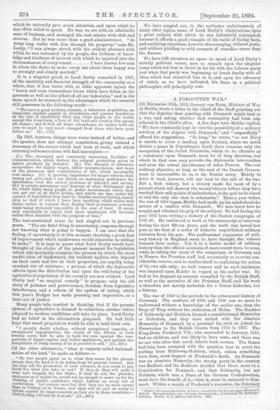A FORGOTTEN WAR.*
ON November 28th, 1862, General von Roon, Minister of War at Berlin, wrote a letter to the Chief of the Staff pointing out that the disputes then pending with Denmark might lead to a war, and asking whether that eventuality had been con- sidered in the Chief's office. A few days later Moltke replied, " We have constantly kept in view the possibility of a military solution of the dispute with Denmark," and " respectfully " offered his suggestions. " So long," be wrote, " as our Navy is unable to cover a landing upon Seeland, where we could dictate a peace in Copenhagen itself, there remains only the occupation of the Jutish Peninsula, which to be effective as a constraint upon Denmark, must be of long duration, but which in that case may provoke the diplomatic intervention and even the actual interference of other Powers. The real military objective, so long as the seat of the Danish Govern- ment is inaccessible to us, is the Danish army. Merely to drive it back, however, will not lead to the end of the war. Not a first victory, but a victory made the most of by a pursuit which will destroy the enemy's forces before they have reached their safe points of embarkation, is the goal to be aimed at and the only one that is attainable." Thus a year before the war of 1864 began, Moltke had made up his mind about the nature of a conflict with Denmark. We now know how he sought and obtained his grip of the subject. He had during the year 1862 been writing a history of the Danish campaigns of 1848.49. He continued to work at his manuscript at intervals daring the next fifteen years, and the work was issued last year as the first of a series of hitherto unpublished military histories from his pen. The professional exponents of mili- tary history in England seem to have thought the volume beneath their notice. Yet it is a better model of military history than the official accounts of more recent wars, because, while in telling the story of the campaigns in Germany and in France, the Prussian staff had necessarily to exercise con- siderable reserve, and to confine itself to explaining the action of its own side only; no such reserve and no such limitation was imposed upon Moltke in regard to the earlier war. He had at his disposal an account compiled by the Danish Staff, as well as the narrative of the Prussian Staff, and his work is therefore not merely materials for a future historian, but a history.
The war of 1848 is the prelude to the subsequent history of Germany. The conflicts of 1864 and 1866 can no more be understood without a knowledge of the earlier one, than the Siege of Troy without the abduction of Helen. The Duchies of Schleswig and Holstein formed a constitutional Monarchy or Dukedom, and they were united with the absolute Monarchy of Denmark by a personal tie, such as joined the Hanoverian to the British Crown from 1714 to 1837. The King-Duke Frederick VII., who succeeded in January, 1848, had no children, and was likely to have none, and there was no one who after him could inherit both crowns. The Danes had long been occupied with the question how to avert the parting from Schleswig-Holstein, which, unless something were done, must happen at Frederick's death. As Denmark was an absolute Monarchy, the strong party in the country was Radical, and the Radicals decided that there must be a Constitution for Denmark, and that Schleswig, but not Holstein, which was a State of the German Confederation, must have the benefit of it,—tb at is, must be annexed to Den- mark. Within a month of Frederick's accession, the February * Moltko's Kricgsgeschichtliche Arbeiten eschichte dee Kriogee gegen Danonterk, 1848.49. Ileranegegeben vein Grossen Gonornisto133, Abtheilang f Ur Krlegsge. schiolite. Berlin: E. 8. Mittior and Sole. 1893. revolution at Paris came like a thunderclap upon Continental Princes, and Frederick, being a person of no character, at once surrendered to his Radicals, made himself a Constitutional Monarch, and announced that the Constitution was for the " whole Monarchy,"—in other words, that he would annex Schleswig. A deputation sent from Schleswig-Holstein to protest against this arbitrary, illegal, and unconstitutional proceeding was received with insult, and the Danish Army and Navy were placed upon a war footing. The Duchies thereupon set up a provisional Government, called out their own troops (about a quarter of the, till then, Danish Army), and took possession of the fortress of Rendsburg. The action of Denmark aroused a storm of indignation throughout Germany, and several German Monarchs, being in fear of revolution, determined to espouse the popular cause of Schleswig-Holstein. The Kings of Prussia and Hanover sent each a division of troops into Holstein, and several lesser potentates sent smaller contingents. The Diet of the German Confederation also, after a little delay, declared war against Den- mark. While the German forces were assembling in Holstein the Danish army invaded Schleswig. The Schleswig-Holstein, troops, six thousand four hundred strong, were spread out in a cordon of outposts in front of Flensburg, and none of the commanders had the strength of mind to order this weak force back to its German supports, nor the judgment to con- centrate it before it was attacked. On the 9th of April the Danes, with eleven thousand men, attacked and dispersed it, fol- lowing quietly to the town of Schleswig. The German troops were not yet ready, and negotiations between various Govern- ments were required before the first move. At length, on the 23rd of April the Prussian division, twelve thousand strong, advanced from Rendsburg to attack the Danish army of about the same numbers at Schleswig. The orders issued in advance contemplated holding the Danes in front with half the force, while the other half moved against its right flank. But as soon as the advanced guard of his right column, destined for the front attack, came into contact with the enemy, Wrangel, the Prussian commander, assisted by nearly all his Generals, took charge of this little skirmish. There was therefore no one to manage the battle. The Prussian troops were well trained and disciplined, and the Danes not much better than volunteers. Accordingly, the Prussian companies fought their way forward into the town, and when darkness came on, the Danes, tired out and feeling beaten, withdrew. Next day the Danish army retreated in disorderly haste. Wrangel, when at night he suspected that his troops had won a battle, sent for the Hanoverian division, twenty miles away, to lead the pursuit. Accordingly, as was to be expected, the Danish army escaped, and two days later was safe in the island of Alsen. Wrangel then realised that his victory was barren, and that he had lost his one chance of destroying the Danish army. The Danes had a fleet and the Germans had none, so the Danes could move their troops by sea when and where they pleased. They placed a small force in Jutland as a bait, which Wrangel followed, but of course could not catch, for when pressed it disappeared to sea. Mean- while the Danes in Alsen recrossed the strait and fell upon the detachment left to watch them. When Wrangel turned , back to repair this little reverse, the Danes landed a fresh , force in Jutland to follow him down the peninsula. In July, Wrangel reported home : "It will be impossible to force the Danes to fight and to compel them to accept a peace except with the help of an allied fleet." The Danish command of the sea' stalemated the Germans on land, while the Danish Fleet was inflicting enormous damage to German trade by a blockade of the ports in the North Sea and the Baltic.
In short, the King of Prussia and his German allies had committed the elementary blunder of beginning a war with- out knowing how they proposed to finish it. If they had well understood that the only chance of success lay in des- troying the Danish army, Wrangel's mistake of letting it escape would hardly have occurred. But the German allies had made an even greater and more fundamental error, a false step, not merely of strategy, but of policy. They had completely forgotten that there were other Powers which were on the Danish side. As soon as Wrangel appeared in Jutland, Sweden protested and prepared an expeditionary force, and the Czar Nicholas sent to the German Courts a note as strong as it could be short of an ultimatum, in which he plainly declared himself on the Danish side. By September the Germans agreed to an armistice in which the Danish claims were provisionally admitted. This secured the Danes for the winter when they were afraid of an attack across the ice. In the spring of 1849, being sure of Russia, they terminated the armistice and renewed the war. A fresh Prussian General, Prittwitz, was entrusted with the task of chasing an army that invariably retreated,. but fell upon any detachments he might unwarily expose. He ended his campaign by allowing twenty thousand Danes to attack and nearly destroy the little Schleswig-Holstein army left by itself in front of Frederieia. Then came a fresh armistice, in which, at Russia's bidding, Prussia left Schleswig and Holstein to their fate. At this point, Moltke's history ends, though the war in Denmark went on. The Duchies, abandoned by their allies, raised an army of forty thousand men, and held out until January, 1851, when Prussia, now completely under the heel of Russia and Austria, was com- pelled to interfere on the side of Denmark, and to join with Austria in an ultimatum requiring the disbandment of the Schleswig-Holstein army.
The war is full of interesting episodes. The achievemente and the failures of the numerous volunteers in the Schleswig. Holstein service well illustrate the strength and the weakness. of such troops. The capture of a Danish line-of-battle ship and a frigate by a handful of artillerymen at EckernfLirde (April 5th, 1849), is one of the most remarkable events in naval warfare. This frigate, it may be interesting to note, is the ' Gefion,' now about to sail to Japan as flagship of the German squadron.
Moltke's history is described by the Prussian Staff in their preface as worthy of the name it bears. It certainly tells, with perfect lucidity, a story which in itself has hardly a parallel for elaborate intricacy. It is exhaustive yet eon- cise. It abounds with brilliant though sober tactical and strategical criticism. The author touches upon politics only when he is compelled, so many readers will be glad to supplement his story by a reference to Sybel's more recant work. No one can read the volume—whioh, by the way, is amply provided with maps and plans—without learning that sound policy is the foundation of military success, and that the command of the sea, even in the hands of an insignificant military Power, may counterbalance a number of victories won upon land by a far stronger enemy. But the distinctive merit of the book, which entitles it to be called a masterpiece, lies in a command of the subject so perfect that the story of a dismal failure becomes in the author's hands a series of con- vincing lessons in war.



































 Previous page
Previous page